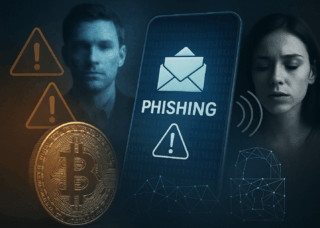A recent public filing by the United States Federal Bureau of Investigation (FBI) has drawn attention, unveiling their operations over three months, from March to May. According to Binance News, the FBI’s significant actions were motivated by a series of violations of federal regulations, leading them to seize a substantial sum of digital assets.
With this move, the FBI not only secured around $1.7 million in digital assets but also emphasized to the global crypto community the importance of regulatory compliance.
Detailed Breakdown of the Assets Seized
- Bitcoin (BTC): $147,000
- Ether (ETH): $800,000
- Tether (USDT): $307,000
- Dai (DAI): 469,000
- Monero (XMR): $20,000
Many of these assets were traced back to wallets on the Binance exchange, pointing to potential vulnerabilities even on leading platforms.
- Noteworthy Seizures: In the Eastern District of Virginia, the FBI’s operations seized 428.5 ETH, with one seizure alone being a substantial $463,000.
- The Reason Behind the Seizures: As per the FBI’s statement, these assets were seized for violations of federal law. Interestingly, alongside cryptocurrencies, tangible assets like sports cars, luxury goods, and even U.S. dollars from bank accounts were seized, painting a broader picture of the reach and implications of cybercrimes.
What Does it Mean for the Crypto Community?
In an age where digital transactions and online engagements are commonplace, the domain of cyber investigations has become more crucial than ever. With cybercrimes evolving in tandem with digital innovations, there’s a pressing need for vigilance, awareness, and understanding. The FBI’s recent activities offer a glimpse into the world of cyber threats, specifically within the crypto space:
Rising threats of scams in NFT Space
The FBI highlighted a concerning rise of scams within the nonfungible token (NFT) ecosystem. Account hijackers create a pressing “sense of urgency,” luring victims to fake websites. This form of deception is especially troubling given the burgeoning popularity of NFTs.
As more people invest and engage in the NFT space without adequate knowledge or precaution, the scope for scams has unfortunately expanded. To stay safe in the dynamic NFT space:
- Stay Informed: Regularly update yourself about common NFT scams.
- Double-Check: Before making any transactions, ensure the website or platform’s authenticity.
- Avoid Rush Decisions: Scammers often create urgency. Take a moment to think before you act.
Increase in Social Media Deceptions
As social media platforms become increasingly integrated into our daily lives, they also present an attractive channel for cybercriminals. The FBI’s data also points to criminals compromising or imitating official accounts to facilitate fraud. This deceptive tactic emphasizes the necessity for heightened scrutiny on social platforms.
To maintain your security on social platforms, do the following:
- Profile Verification: Seek verification badges on reputed accounts.
- Question Dubious Claims: Exercise skepticism with too-good-to-be-true offers.
- Secure Your Account: Implement regular password changes and two-factor authentication.
Beware of Bogus Crypto Job Advertisements
Employment opportunities, especially in a niche sector like cryptocurrency, can attract many eager job-seekers. Earlier this year, false job advertisements related to crypto investment fraud emerged. This strategy showcases the diverse approaches adopted by scammers.
However, these fake listings can lead individuals into unwanted legal troubles, financial losses, or both. It’s a stark reminder that while the digital age offers numerous opportunities, it also demands a discerning approach to differentiate genuine offers from fraudulent schemes.
To discern genuine job offers from scams:
- Research Employers: Conduct comprehensive checks on potential employers.
- Beware of Overpromises: Stay wary of unrealistic job packages.
- Never Pay Upfront: Genuine job opportunities won’t demand advance payments.

What Makes Crypto Assets a Target?
The allure of digital currencies, while promising transformative financial possibilities, is equally attractive to cybercriminals. Their decentralized nature, coupled with anonymity features, makes them a prime target.
- Anonymity: Cryptocurrencies, especially ones like Monero, are designed to ensure user privacy. This trait, while beneficial for users, also aids cybercriminals in masking their activities.
- Irreversible Transactions: Once a cryptocurrency transaction is confirmed, it can’t be reversed. This makes it crucial to double-check transactions but also offers scammers a perfect loophole to exploit.
- Decentralization: Being devoid of central regulatory authority, digital currencies lack the same safety checks found in traditional banking systems, making them more susceptible.
- Rapid Growth and Adoption: The swift growth and widespread adoption of cryptocurrencies have led to many newcomers in the space. Scammers often exploit the lack of knowledge of these new entrants.
- The complexity of Technology: While blockchain technology offers security, its complexity can be challenging for average users to grasp fully. This creates opportunities for scammers to take advantage of misconceptions.
How You Can Protect Yourself Against Cybercrimes?
In the vast, ever-evolving landscape of the digital world, self-protection forms the first line of defense against cybercrimes.
Basic steps such as enabling two-factor authentication, regularly updating software, and being wary of unsolicited communications can go a long way. But diving deeper, understanding the tactics employed by scammers, and being informed about the latest threats is essential. Knowledge truly is power in the realm of cybersecurity.
To learn more, read our guide on safeguarding yourself against cybercrimes where we walk you through best practices, tools, and strategies to fortify your digital presence.
How a Private Investigator Can Help You Against Cyber Crimes?
The expertise of a Private Investigator (PI) is vital when dealing with cybersecurity and digital assets. They have specific skills and tools that can protect and assist in the face of online threats.
Forensic Analysis
Forensic analysis is critical in cyber investigations. PIs use digital forensic tools to trace unauthorized activities. This involves tracking unauthorized cryptocurrency transactions or finding the source of suspicious emails. Through forensic analysis, PIs can uncover evidence and provide clarity on any breaches.
Digital Surveillance
PIs use specialized surveillance tools designed for online use. These tools allow them to monitor and identify potential threats in real-time. The goal is to spot and address risks before they become significant problems. This includes observing unusual online behavior, identifying cyberstalkers, or checking platforms for unauthorized data use.
Recovery and Resolution
Even after a breach or scam, there might still be a chance to recover lost assets. PIs help in this recovery process. Beyond that, they also assist in ensuring that the responsible parties are held legally accountable. PIs work with legal experts and law enforcement to ensure that cybercriminals are brought to justice.
With their knowledge and tools, PIs offer a necessary layer of protection in the digital space.
To Conclude
The digital currency domain, though filled with opportunities, comes with its fair share of challenges. Staying vigilant, and informed, and having experts by your side is the way forward in this dynamic landscape.
Need Assistance?
Concerned about your digital assets or suspect a scam? We at Privin offer specialized assistance in navigating the challenges of the digital age, especially financial scams and frauds.
Connect with our experienced PIs at Privin’s Cybercrime Investigation Service and get help.
Frequently Asked Questions (FAQs) on FBI Cryptocurrency Asset Seizures
Which cryptocurrencies were seized?
The seizures included Bitcoin (BTC), Ether (ETH), Tether (USDT), Dai (DAI), and Monero (XMR).
Where were these assets seized?
Many assets were traced to wallets on the Binance exchange, indicating potential vulnerabilities even on leading platforms.
What other assets were confiscated?
In addition to digital currencies, the FBI seized tangible assets such as sports cars, luxury goods, and U.S. dollars from bank accounts.
How can individuals protect themselves from crypto-related scams?
Stay informed about common cryptocurrency scams, verify the authenticity of platforms before making transactions, and avoid making rushed decisions.






